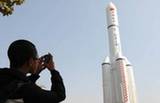Chinese scientist honored by UNESCO For Women in Science award
2015-03-19 06:16:03
Yi Xie, professor at the University of Science and Technology of China, was on Wednesday honored with the L'Oreal-UNESCO For Women in Science Awards 2015, together with four other women for their ground-breaking discoveries in physical sciences.
Jiaolong concludes Indian Ocean expedition
2015-03-18 10:55:00
 China's deep-sea manned submersible Jiaolong has concluded a 120-day expedition in the southwest Indian Ocean, Yu Hongjun, mission commander, said Monday.
China's deep-sea manned submersible Jiaolong has concluded a 120-day expedition in the southwest Indian Ocean, Yu Hongjun, mission commander, said Monday.
Private companies asked to join moon program
2015-03-17 07:34:27
China will open its lunar exploration program to private enterprises in an attempt to boost technological innovation and break State-owned companies' monopoly in the space field.
China's Yutu rover reveals Moon's 'complex' geological history
2015-03-13 07:58:55
The moon's geological history is more complex than previously thought, preliminary results from China's first lunar rover, Yutu, suggested Thursday.
Long March 6 launch to put new engine to the test
2015-03-10 02:41:22
 China will soon conduct the first flight of the Long March 6 launch vehicle using the country's new-generation rocket engine, according to a senior scientist.
China will soon conduct the first flight of the Long March 6 launch vehicle using the country's new-generation rocket engine, according to a senior scientist.
China at technical preparation stage for Mars, asteroid exploration
2015-03-03 20:16:01
China has been researching the technical feasibility of exploring Mars and asteroids, a top space scientist and national political advisor revealed on Tuesday.
China's Beidou gets infrastructure boost on Qinghai-Tibet plateau
2015-02-23 20:06:33
Precision service infrastructure for China's Beidou satellite navigation system will be built on the Qinghai-Tibet Plateau as part of efforts to create a nationwide base station network for high precision navigation and positioning by 2018.
China tops patent applications list in 2014
2015-02-23 18:49:52
China had more invention patent applications than any other country in 2014 for the fourth year running, official data showed on Monday.
Four Chinese among top 100 candidates for one-way trip to Mars
2015-02-22 14:08:27
 Four Chinese are among the candidates for the Mars One project, among whom 24 will be selected to receive training for the supposedly one-way trips.
Four Chinese are among the candidates for the Mars One project, among whom 24 will be selected to receive training for the supposedly one-way trips.
Year of the Sheep brings hope to heart patients
2015-02-17 17:46:06
A ventricular assist device (VAD) implanted in a group of sheep has been working well and the next step is clinical tests, Chinese researchers said.
Peking University president named
2015-02-16 07:53:58
 Lin Jianhua, a chemist who served as president of Zhejiang University since June 2013, was named the 27th president of Peking University on Sunday.
Lin Jianhua, a chemist who served as president of Zhejiang University since June 2013, was named the 27th president of Peking University on Sunday.
China tests new carrier rocket's power system
2015-02-09 20:55:39
Chinese scientists have completed a ground test on the power system of the country's next-generation carrier rocket which may fly as early as next year.